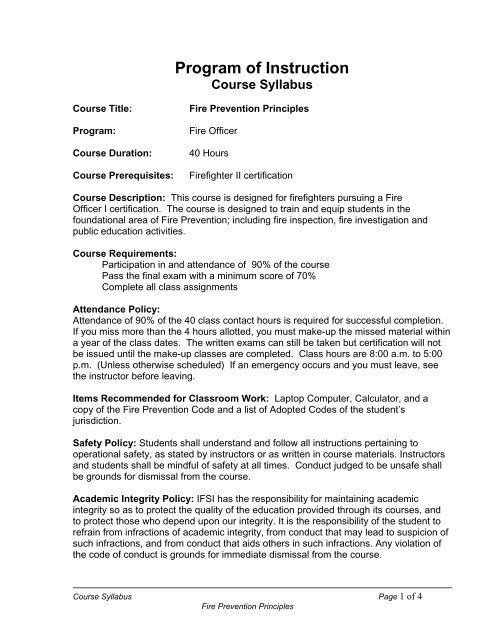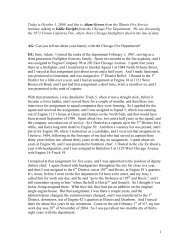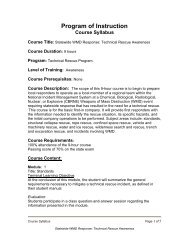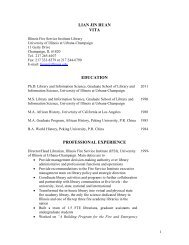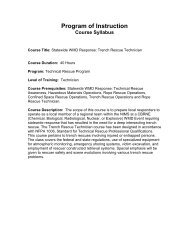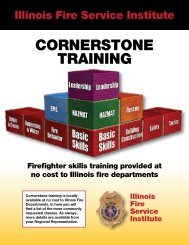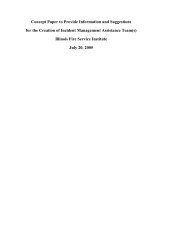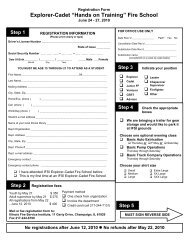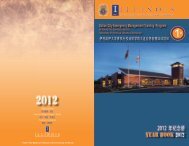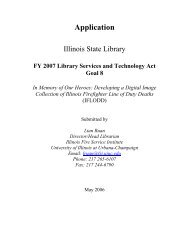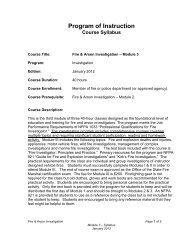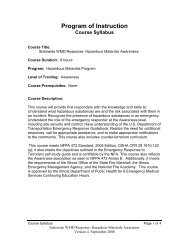Fire Prevention Principles.pdf
Fire Prevention Principles.pdf
Fire Prevention Principles.pdf
You also want an ePaper? Increase the reach of your titles
YUMPU automatically turns print PDFs into web optimized ePapers that Google loves.
Program of InstructionCourse SyllabusCourse Title:Program:Course Duration:Course Prerequisites:<strong>Fire</strong> <strong>Prevention</strong> <strong>Principles</strong><strong>Fire</strong> Officer40 Hours<strong>Fire</strong>fighter II certificationCourse Description: This course is designed for firefighters pursuing a <strong>Fire</strong>Officer I certification. The course is designed to train and equip students in thefoundational area of <strong>Fire</strong> <strong>Prevention</strong>; including fire inspection, fire investigation andpublic education activities.Course Requirements:Participation in and attendance of 90% of the coursePass the final exam with a minimum score of 70%Complete all class assignmentsAttendance Policy:Attendance of 90% of the 40 class contact hours is required for successful completion.If you miss more than the 4 hours allotted, you must make-up the missed material withina year of the class dates. The written exams can still be taken but certification will notbe issued until the make-up classes are completed. Class hours are 8:00 a.m. to 5:00p.m. (Unless otherwise scheduled) If an emergency occurs and you must leave, seethe instructor before leaving.Items Recommended for Classroom Work: Laptop Computer, Calculator, and acopy of the <strong>Fire</strong> <strong>Prevention</strong> Code and a list of Adopted Codes of the student’sjurisdiction.Safety Policy: Students shall understand and follow all instructions pertaining tooperational safety, as stated by instructors or as written in course materials. Instructorsand students shall be mindful of safety at all times. Conduct judged to be unsafe shallbe grounds for dismissal from the course.Academic Integrity Policy: IFSI has the responsibility for maintaining academicintegrity so as to protect the quality of the education provided through its courses, andto protect those who depend upon our integrity. It is the responsibility of the student torefrain from infractions of academic integrity, from conduct that may lead to suspicion ofsuch infractions, and from conduct that aids others in such infractions. Any violation ofthe code of conduct is grounds for immediate dismissal from the course.Course Syllabus Page 1 of 4<strong>Fire</strong> <strong>Prevention</strong> <strong>Principles</strong>
Evaluation Strategy:The instructor will observe individual participation in the classroom and groupdiscussions. The instructor will collect and review all required student materials. Awritten exam will be completed by the student with 70% accuracy.Grading Policy: Decisions regarding certificates of course completion shall be madesolely by the lead instructor of the course. All grading of exams shall be conducted byqualified instructors. All grading of practical exercises shall be based upon thestandards set by the regulatory agency referenced in the course material and IFSI.Reference List:2003 International Codes, Version 2.0, International Code CouncilIFSTA “<strong>Fire</strong> Inspection and Code Enforcement” 7 th editionIFSTA “<strong>Fire</strong> <strong>Prevention</strong> Applications”NFPA 921 “Guide for <strong>Fire</strong> and Explosion Investigations” 2008 editionNFPA 1021 “Professional Qualifications for <strong>Fire</strong> Officer” 2009 editionVideo: <strong>Fire</strong> Protection, Underwriters Laboratories Inc.Video: The Making of Codes and StandardsCourse Syllabus Page 2 of 4<strong>Fire</strong> <strong>Prevention</strong> <strong>Principles</strong>
Course Content:Unit 1: Laws, Codes, and OrdinancesTerminal Learning Objective:The student shall be able to identify, research, and cross reference Laws, Codes, andOrdinances.Unit 2: Building ConstructionTerminal Learning Objective:The student shall be able to identify building construction types and identify thecomponents thereof.Unit 3: <strong>Fire</strong> Protection SystemsTerminal Learning Objective:The student shall be able to identify fire protection system fundamentals.Unit 4: Occupancy and Hazard ClassificationsTerminal Learning Objective:The student shall identify occupancy and hazard classification.Unit 5: <strong>Fire</strong> Inspection ProceduresTerminal Learning Objective:The student shall recall the fire inspection procedures presented.Unit 6: Juvenile <strong>Fire</strong> Setting AwarenessTerminal Learning Objective:The student shall be able to identify the complexities of the juvenile fire setting problem.Unit 7: <strong>Fire</strong> Investigation AwarenessTerminal Learning Objective:The student shall be able to identify the support needed during a fire investigation.Unit 8: Public EducationTerminal Learning Objective:The student shall recall the public education concepts presented.Course Syllabus Page 3 of 4<strong>Fire</strong> <strong>Prevention</strong> <strong>Principles</strong>
EventCourse ScheduleDAY ONEDurationCourse Business and OrientationResearch Project and <strong>Fire</strong> <strong>Prevention</strong> ProjectLaws, Codes and Ordinances1 hour1 hour6 hoursEventBuilding Construction<strong>Fire</strong> Protection SystemsDAY TWODuration4 hours4 hoursEventDAY THREEDurationOccupancy and Hazard Classification<strong>Fire</strong> Inspection ProceduresField InspectionsWork on Projects2 hours1 hour4 hours1 hourEventJuvenile <strong>Fire</strong> Setting AwarenessReview: Field Inspection Findings<strong>Fire</strong> Investigation AwarenessExam ReviewPresentations / Work on ProjectsEventDAY FOURDAY FIVEDuration2 hours1 hour3 hours½ hour1 ½ hoursDurationPublic EducationPublic Education Project PresentationsResearch Project PresentationsFinal Exam3 hours2 hours2 hours1 hourCourse Syllabus Page 4 of 4<strong>Fire</strong> <strong>Prevention</strong> <strong>Principles</strong>


